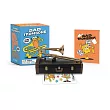J. R. R. Tolkien (1892-1973) is widely regarded as one of the most important writers of the twentieth century. His popularity began with the publication in 1937 of The Hobbit, and was cemented by the appearance of The Lord of the Rings in the early 1950s. However, engagement with his work was until relatively recently sidelined by literary and other scholars. Consequently, many foundational analyses of his fiction, and his work as a medievalist, are dispersed in hard-to-find monographs and obscure journals (often produced by dedicated amateurs). In contrast, over the last decade or so, academic interest in Tolkien has risen dramatically. Indeed, interpretative and critical commentary is now being generated on a bewildering scale, in part aided by the continuing posthumous publication of his work (most recently, his Beowulf translation which appeared in 2014). The dizzying quantity--and variable quality--of this later criticism makes it difficult to discriminate the useful from the tendentious, superficial, and otiose.
Now, in four volumes, a new collection from Routledge’s Critical Assessments of Major Writers series meets the need for an authoritative reference work to collect early evaluations and to make sense of the more recent explosion in research output. Users are now able easily and rapidly to locate the best and most influential critical assessments. With material gathered into one easy-to-use set, Tolkien researchers and students can now spend more of their time with the key journal articles, book chapters, and other pieces, rather than on time-consuming (and sometimes fruitless) archival searches.



 天天爆殺
天天爆殺  今日66折
今日66折 




























 博客來
博客來 博客來
博客來 博客來
博客來 博客來
博客來 博客來
博客來